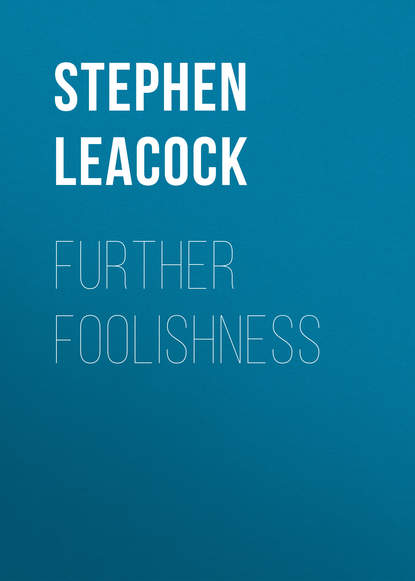 Полная версия
Полная версияПолная версия:
Стивен Батлер Ликок Further Foolishness
- + Увеличить шрифт
- - Уменьшить шрифт

Stephen Leacock
Further Foolishness
Preface
Many years ago when I was a boy at school, we had over our class an ancient and spectacled schoolmaster who was as kind at heart as he was ferocious in appearance, and whose memory has suggested to me the title of this book.
It was his practice, on any outburst of gaiety in the class-room, to chase us to our seats with a bamboo cane and to shout at us in defiance:
Now, then, any further foolishness?
I find by experience that there are quite a number of indulgent readers who are good enough to adopt the same expectant attitude towards me now.
STEPHEN LEACOCK
McGILL UNIVERSITY
MONTREAL
November 1, 1916
Follies in Fiction
I. Stories Shorter Still
Among the latest follies in fiction is the perpetual demand for stories shorter and shorter still. The only thing to do is to meet this demand at the source and check it. Any of the stories below, if left to soak overnight in a barrel of rainwater, will swell to the dimensions of a dollar-fifty novel.
(I) AN IRREDUCIBLE DETECTIVE STORY
HANGED BY A HAIR OR A MURDER MYSTERY MINIMISEDThe mystery had now reached its climax. First, the man had been undoubtedly murdered. Secondly, it was absolutely certain that no conceivable person had done it.
It was therefore time to call in the great detective.
He gave one searching glance at the corpse. In a moment he whipped out a microscope.
"Ha! ha!" he said, as he picked a hair off the lapel of the dead man's coat. "The mystery is now solved."
He held up the hair.
"Listen," he said, "we have only to find the man who lost this hair and the criminal is in our hands."
The inexorable chain of logic was complete.
The detective set himself to the search.
For four days and nights he moved, unobserved, through the streets of New York scanning closely every face he passed, looking for a man who had lost a hair.
On the fifth day he discovered a man, disguised as a tourist, his head enveloped in a steamer cap that reached below his ears. The man was about to go on board the Gloritania.
The detective followed him on board.
"Arrest him!" he said, and then drawing himself to his full height, he brandished aloft the hair.
"This is his," said the great detective. "It proves his guilt."
"Remove his hat," said the ship's captain sternly.
They did so.
The man was entirely bald.
"Ha!" said the great detective without a moment of hesitation. "He has committed not one murder but about a million."
(II) A COMPRESSED OLD ENGLISH NOVEL
SWEARWORD THE UNPRONOUNCEABLECHAPTER ONE AND ONLY"Ods bodikins!" exclaimed Swearword the Saxon, wiping his mailed brow with his iron hand, "a fair morn withal! Methinks twert lithlier to rest me in yon glade than to foray me forth in yon fray! Twert it not?"
But there happened to be a real Anglo-Saxon standing by.
"Where in heaven's name," he said in sudden passion, "did you get that line of English?"
"Churl!" said Swearword, "it is Anglo-Saxon."
"You're a liar!" shouted the Saxon, "it is not. It is Harvard College, Sophomore Year, Option No. 6."
Swearword, now in like fury, threw aside his hauberk, his baldrick, and his needlework on the grass.
"Lay on!" said Swearword.
"Have at you!" cried the Saxon.
They laid on and had at one another.
Swearword was killed.
Thus luckily the whole story was cut off on the first page and ended.
(III) A CONDENSED INTERMINABLE NOVEL
FROM THE CRADLE TO THE GRAVE OR A THOUSAND PAGES FOR A DOLLARNOTE.-This story originally contained two hundred and fifty thousand words. But by a marvellous feat of condensation it is reduced, without the slightest loss, to a hundred and six words.
(I)Edward Endless lived during his youth in Maine, in New Hampshire, in Vermont, in Massachusetts, in Rhode Island, in Connecticut.(II)Then the lure of the city lured him. His fate took him toNew York, to Chicago, and to Philadelphia.In Chicago he lived,in a boarding-house on Lasalle Avenue,then he boarded—in a living-house on Michigan Avenue.In New York hehad a room in an eating-house on Forty-first Street,and then—ate in a rooming-house on Forty-second Street.In Philadelphia heused to sleep on Chestnut Street,and then—slept on Maple Street.During all this time women were calling to him. He knew and came to be friends with— Margaret Jones, Elizabeth Smith, Arabella Thompson, Jane Williams, Maud Taylor.And he also got to know pretty well, Louise Quelquechose, Antoinette Alphabetic, Estelle Etcetera.And during this same time Art began to call him— Pictures began to appeal to him. Statues beckoned to him. Music maddened him, and any form of Recitation or Elocution drove him beside himself.(III)Then, one day, he married Margaret Jones. As soon as he had married her He was disillusioned. He now hated her.Then he lived with Elizabeth Smith— He had no sooner sat down with her than— He hated her.Half mad, he took his things over to Arabella Thompson's flat to live with her.
The moment she opened the door of the apartment, he loathed her.
He saw her as she was.
Driven sane with despair, he then—
(Our staff here cut the story off. There are hundreds and hundreds of pages after this. They show Edward Endless grappling in the fight for clean politics. The last hundred pages deal with religion. Edward finds it after a big fight. But no one reads these pages. There are no women in them. Our staff cut them out and merely show at the end—
Edward Purified— Uplifted— Transluted.The whole story is perhaps the biggest thing ever done on this continent. Perhaps!)
II. Snoopopaths; or, Fifty Stories in One
This particular study in the follies of literature is not so much a story as a sort of essay. The average reader will therefore turn from it with a shudder. The condition of the average reader's mind is such that he can take in nothing but fiction. And it must be thin fiction at that—thin as gruel. Nothing else will "sit on his stomach."
Everything must come to the present-day reader in this form. If you wish to talk to him about religion, you must dress it up as a story and label it Beth-sheba, or The Curse of David; if you want to improve the reader's morals, you must write him a little thing in dialogue called Mrs. Potiphar Dines Out. If you wish to expostulate with him about drink, you must do so through a narrative called Red Rum—short enough and easy enough for him to read it, without overstraining his mind, while he drinks cocktails.
But whatever the story is about it has got to deal—in order to be read by the average reader—with A MAN and A WOMAN, I put these words in capitals to indicate that they have got to stick out of the story with the crudity of a drawing done by a child with a burnt stick. In other words, the story has got to be snoopopathic. This is a word derived from the Greek—"snoopo"—or if there never was a Greek verb snoopo, at least there ought to have been one—and it means just what it seems to mean. Nine out of ten short stories written in America are snoopopathic.
In snoopopathic literature, in order to get its full effect, the writer generally introduces his characters simply as "the man" and "the woman." He hates to admit that they have no names. He opens out with them something after this fashion: "The Man lifted his head. He looked about him at the gaily bedizzled crowd that besplotched the midnight cabaret with riotous patches of colour. He crushed his cigar against the brass of an Egyptian tray. 'Bah!' he murmured, 'Is it worth it?' Then he let his head sink again."
You notice it? He lifted his head all the way up and let it sink all the way down, and you still don't know who he is. For The Woman the beginning is done like this: "The Woman clenched her white hands till the diamonds that glittered upon her fingers were buried in the soft flesh. 'The shame of it,' she murmured. Then she took from the table the telegram that lay crumpled upon it and tore it into a hundred pieces. 'He dare not!' she muttered through her closed teeth. She looked about the hotel room with its garish furniture. 'He has no right to follow me here,' she gasped."
All of which the reader has to take in without knowing who the woman is, or which hotel she is staying at, or who dare not follow her or why. But the modern reader loves to get this sort of shadowy incomplete effect. If he were told straight out that the woman's name was Mrs. Edward Dangerfield of Brick City, Montana, and that she had left her husband three days ago and that the telegram told her that he had discovered her address and was following her, the reader would refuse to go on.
This method of introducing the characters is bad enough. But the new snoopopathic way of describing them is still worse. The Man is always detailed as if he were a horse. He is said to be "tall, well set up, with straight legs."
Great stress is always laid on his straight legs. No magazine story is acceptable now unless The Man's legs are absolutely straight. Why this is, I don't know. All my friends have straight legs—and yet I never hear them make it a subject of comment or boasting. I don't believe I have, at present, a single friend with crooked legs.
But this is not the only requirement. Not only must The Man's legs be straight but he must be "clean-limbed," whatever that is; and of course he must have a "well-tubbed look about him." How this look is acquired, and whether it can be got with an ordinary bath and water are things on which I have no opinion.
The Man is of course "clean-shaven." This allows him to do such necessary things as "turning his clean-shaven face towards the speaker," "laying his clean-shaven cheek in his hand," and so on. But every one is familiar with the face of the up-to-date clean-shaven snoopopathic man. There are pictures of him by the million on magazine covers and book jackets, looking into the eyes of The Woman—he does it from a distance of about six inches—with that snoopy earnest expression of brainlessness that he always wears. How one would enjoy seeing a man—a real one with Nevada whiskers and long boots—land him one solid kick from behind.
Then comes The Woman of the snoopopathic story. She is always "beautifully groomed" (who these grooms are that do it, and where they can be hired, I don't know), and she is said to be "exquisitely gowned."
It is peculiar about The Woman that she never seems to wear a dress—always a "gown." Why this is, I cannot tell. In the good old stories that I used to read, when I could still read for the pleasure of it, the heroines —that was what they used to be called—always wore dresses. But now there is no heroine, only a woman in a gown. I wear a gown myself—at night. It is made of flannel and reaches to my feet, and when I take my candle and go out to the balcony where I sleep, the effect of it on the whole is not bad. But as to its "revealing every line of my figure"—as The Woman's gown is always said to—and as to its "suggesting even more than it reveals"—well, it simply does not. So when I talk of "gowns" I speak of something that I know all about.
Yet, whatever The Woman does, her "gown" is said to "cling" to her. Whether in the street or in a cabaret or in the drawing-room, it "clings." If by any happy chance she throws a lace wrap about her, then it clings; and if she lifts her gown—as she is apt to—it shows, not what I should have expected, but a jupon, and even that clings. What a jupon is I don't know. With my gown, I never wear one. These people I have described, The Man and The Woman—The Snoopopaths—are, of course, not husband and wife, or brother and sister, or anything so simple and old-fashioned as that. She is some one else's wife. She is The Wife of the Other Man. Just what there is, for the reader, about other men's wives, I don't understand. I know tons of them that I wouldn't walk round a block for. But the reading public goes wild over them. The old-fashioned heroine was unmarried. That spoiled the whole story. You could see the end from the beginning. But with Another Man's Wife, the way is blocked. Something has got to happen that would seem almost obvious to anyone.
The writer, therefore, at once puts the two snoopos—The Man and The Woman—into a frightfully indelicate position. The more indelicate it is, the better. Sometimes she gets into his motor by accident after the theatre, or they both engage the drawing-room of a Pullman car by mistake, or else, best of all, he is brought accidentally into her room at an hotel at night. There is something about an hotel room at night, apparently, which throws the modern reader into convulsions. It is always easy to arrange a scene of this sort. For example, taking the sample beginning that I gave above, The Man, whom I left sitting at the cabaret table, above, rises unsteadily —it is the recognised way of rising in a cabaret—and, settling the reckoning with the waiter, staggers into the street. For myself I never do a reckoning with the waiter. I just pay the bill as he adds it, and take a chance on it.
As The Man staggers into the "night air," the writer has time—just a little time, for the modern reader is impatient—to explain who he is and why he staggers. He is rich. That goes without saying. All clean-limbed men with straight legs are rich. He owns copper mines in Montana. All well-tubbed millionaires do. But he has left them, left everything, because of the Other Man's Wife. It was that or madness—or worse. He had told himself so a thousand times. (This little touch about "worse" is used in all the stories. I don't just understand what the "worse" means. But snoopopathic readers reach for it with great readiness.) So The Man had come to New York (the only place where stories are allowed to be laid) under an assumed name, to forget, to drive her from his mind. He had plunged into the mad round of—I never could find it myself, but it must be there, and as they all plunge into it, it must be as full of them as a sheet of Tanglefoot is of flies.
"As The Man walked home to his hotel, the cool night air steadied him, but his brain is still filled with the fumes of the wine he had drunk." Notice these "fumes." It must be great to float round with them in one's brain, where they apparently lodge. I have often tried to find them, but I never can. Again and again I have said, "Waiter, bring me a Scotch whisky and soda with fumes." But I can never get them.
Thus goes The Man to his hotel. Now it is in a room in this same hotel that The Woman is sitting, and in which she has crumpled up the telegram. It is to this hotel that she has come when she left her husband, a week ago. The readers know, without even being told, that she left him "to work out her own salvation"—driven, by his cold brutality, beyond the breaking-point. And there is laid upon her soul, as she sits there with clenched hands, the dust and ashes of a broken marriage and a loveless life, and the knowledge, too late, of all that might have been.
And it is to this hotel that The Woman's Husband is following her.
But The Man does not know that she is in the hotel, nor that she has left her husband; it is only accident that brings them together. And it is only by accident that he has come into her room, at night, and stands there—rooted to the threshold. Now as a matter of fact, in real life, there is nothing at all in the simple fact of walking into the wrong room of an hotel by accident. You merely apologise and go out. I had this experience myself only a few days ago. I walked right into a lady's room—next door to my own. But I simply said, "Oh, I beg your pardon, I thought this was No. 343."
"No," she said, "this is 341."
She did not rise and "confront" me, as they always do in the snoopopathic stories. Neither did her eyes flash, nor her gown cling to her as she rose. Nor was her gown made of "rich old stuff." No, she merely went on reading her newspaper.
"I must apologise," I said. "I am a little short-sighted, and very often a one and a three look so alike that I can't tell them apart. I'm afraid—"
"Not at all," said the lady. "Good evening."
"You see," I added, "this room and my own being so alike, and mine being 343 and this being 341, I walked in before I realised that instead of walking into 343 I was walking into 341."
She bowed in silence, without speaking, and I felt that it was now the part of exquisite tact to retire quietly without further explanation, or at least with only a few murmured words about the possibility of to-morrow being even colder than to-day. I did so, and the affair ended with complete savoir faire on both sides.
But the Snoopopaths, Man and Woman, can't do this sort of thing, or, at any rate, the snoopopathic writer won't let them. The opportunity is too good to miss. As soon as The Man comes into The Woman's room—before he knows who she is, for she has her back to him—he gets into a condition dear to all snoopopathic readers.
His veins simply "surged." His brain beat against his temples in mad pulsation. His breath "came and went in quick, short pants." (This last might perhaps be done by one of the hotel bellboys, but otherwise it is hard to imagine.)
And The Woman—"Noiseless as his step had been, she seemed to sense his presence. A wave seemed to sweep over her —She turned and rose fronting him full." This doesn't mean that he was full when she fronted him. Her gown—but we know about that already. "It was a coward's trick," she panted.
Now if The Man had had the kind of savoir faire that I have, he would have said: "Oh, pardon me! I see this room is 341. My own room is 343, and to me a one and a three often look so alike that I seem to have walked into 341 while looking for 343." And he could have explained in two words that he had no idea that she was in New York, was not following her, and not proposing to interfere with her in any way. And she would have explained also in two sentences why and how she came to be there. But this wouldn't do. Instead of it, The Man and The Woman go through the grand snoopopathic scene which is so intense that it needs what is really a new kind of language to convey it.
"Helene," he croaked, reaching out his arms—his voice tensed with the infinity of his desire.
"Back," she iced. And then, "Why have you come here?" she hoarsed. "What business have you here?"
"None," he glooped, "none. I have no business." They stood sensing one another.
"I thought you were in Philadelphia," she said—her gown clinging to every fibre of her as she spoke.
"I was," he wheezed.
"And you left it?" she sharped, her voice tense.
"I left it," he said, his voice glumping as he spoke. "Need I tell you why?" He had come nearer to her. She could hear his pants as he moved.
"No, no," she gurgled. "You left it. It is enough. I can understand"—she looked bravely up at him—"I can understand any man leaving it."
Then as he moved still nearer her, there was the sound of a sudden swift step in the corridor. The door opened and there stood before them The Other Man, the Husband of The Woman—Edward Dangerfield.
This, of course, is the grand snoopopathic climax, when the author gets all three of them—The Man, The Woman, and The Woman's Husband—in an hotel room at night. But notice what happens.
He stood in the opening of the doorway looking at them, a slight smile upon his lips.
"Well?" he said. Then he entered the room and stood for a moment quietly looking into The Man's face.
"So," he said, "it was you." He walked into the room and laid the light coat that he had been carrying over his arm upon the table. He drew a cigar-case from his waistcoat pocket.
"Try one of these Havanas," he said.
Observe the calm of it. This is what the snoopopath loves—no rage, no blustering—calmness, cynicism. He walked over towards the mantelpiece and laid his hat upon it. He set his boot upon the fender.
"It was cold this evening," he said. He walked over to the window and gazed a moment into the dark.
"This is a nice hotel," he said. (This scene is what the author and the reader love; they hate to let it go. They'd willingly keep the man walking up and down for hours saying "Well!")
The Man raised his head! "Yes, it's a good hotel," he said. Then he let his head fall again.
This kind of thing goes on until, if possible, the reader is persuaded into thinking that there is nothing going to happen. Then:
"He turned to The Woman. 'Go in there,' he said, pointing to the bedroom door. Mechanically she obeyed." This, by the way, is the first intimation that the reader has that the room in which they were sitting was not a bedroom. The two men were alone. Dangerfield walked over to the chair where he had thrown his coat.
"I bought this coat in St. Louis last fall," he said. His voice was quiet, even passionless. Then from the pocket of the coat he took a revolver and laid it on the table. Marsden watched him without a word.
"Do you see this pistol?" said Dangerfield.
Marsden raised his head a moment and let it sink.
Of course the ignorant reader keeps wondering why he doesn't explain. But how can he? What is there to say? He has been found out of his own room at night. The penalty for this in all the snoopopathic stories is death. It is understood that in all the New York hotels the night porters shoot a certain number of men in the corridors every night.
"When we married," said Dangerfield, glancing at the closed door as he spoke, "I bought this and the mate to it—for her—just the same, with the monogram on the butt—see! And I said to her, 'If things ever go wrong between you and me, there is always this way out.'"
He lifted the pistol from the table, examining its mechanism. He rose and walked across the room till he stood with his back against the door, the pistol in his hand, its barrel pointing straight at Marsden's heart. Marsden never moved. Then as the two men faced one another thus, looking into one another's eyes, their ears caught a sound from behind the closed door of the inner room—a sharp, hard, metallic sound as if some one in the room within had raised the hammer of a pistol—a jewelled pistol like the one in Dangerfield's hand.
And then—
A loud report, and with a cry, the cry of a woman, one shrill despairing cry—
Or no, hang it—I can't consent to end up a story in that fashion, with the dead woman prone across the bed, the smoking pistol, with a jewel on the hilt, still clasped in her hand—the red blood welling over the white laces of her gown—while the two men gaze down upon her cold face with horror in their eyes. Not a bit. Let's end it like this:
"A shrill despairing cry—'Ed! Charlie! Come in here quick! Hurry! The steam coil has blown out a plug! You two boys quit talking and come in here, for heaven's sake, and fix it.'" And, indeed, if the reader will look back he will see there is nothing in the dialogue to preclude it. He was misled, that's all. I merely said that Mrs. Dangerfield had left her husband a few days before. So she had—to do some shopping in New York. She thought it mean of him to follow her. And I never said that Mrs. Dangerfield had any connection whatever with The Woman with whom Marsden was in love. Not at all. He knew her, of course, because he came from Brick City. But she had thought he was in Philadelphia, and naturally she was surprised to see him back in New York. That's why she exclaimed "Back!" And as a matter of plain fact, you can't pick up a revolver without its pointing somewhere. No one said he meant to fire it.
In fact, if the reader will glance back at the dialogue—I know he has no time to, but if he does—he will see that, being something of a snoopopath himself, he has invented the whole story.
III. Foreign Fiction in Imported Instalments





